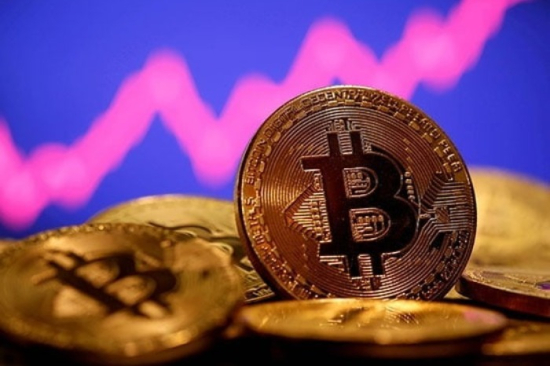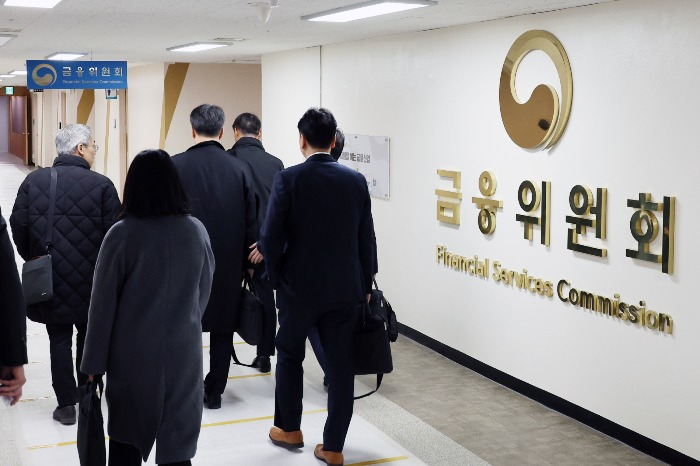Cryptocurrencies
Foreign-listed bitcoin ETF trading suspended in S.Korea
S.Korean investors have traded Canada and Germany-listed spot bitcoin ETFs through securities firms since 2021
By Jan 12, 2024 (Gmt+09:00)
3
Min read
Most Read
LG Chem to sell water filter business to Glenwood PE for $692 million


Kyobo Life poised to buy Japan’s SBI Group-owned savings bank


KT&G eyes overseas M&A after rejecting activist fund's offer


StockX in merger talks with Naver’s online reseller Kream


Mirae Asset to be named Korea Post’s core real estate fund operator



South Korean investors’ years-long trading of spot-bitcoin exchange-traded funds (ETFs) listed in Canada and Germany was abruptly suspended due to an ambiguous message from the country’s financial regulator, which has decided to disallow local investors’ trading of the first US spot-bitcoin ETFs.
According to the Korean securities industry on Friday, Korea’s major securities firms, including Mirae Asset Securities Co. and Samsung Securities Co., have rushed to halt their brokerage services for local investors to trade spot-bitcoin ETFs listed in Canada and Germany.
Korean investors have been trading the world’s first spot-bitcoin ETF, Purpose Bitcoin ETF (BTCC), through local brokerages since its debut on the Canadian stock bourse in February 2021.
But Korea's Financial Services Commission (FSC) on Thursday announced a ban on Korean investors’ investment in US spot-bitcoin ETFs, which gained the nod for trading in the US a day earlier, saying that bitcoin ETFs are not categorized as a legitimate financial investment product under Korean law.
It warned in a press release that Korean securities firms’ trading of foreign country-listed spot-bitcoin ETFs for their local clients could go against the Korean government’s stance on cryptocurrencies or violate Korea’s Capital Markets Act.
The FSC’s message has caused confusion among Korean brokerage houses that have traded Canada and Germany-listed spot-bitcoin ETFs for Korean investors for years without any intervention or warning from the Korean financial regulator.
“It is not clear whether we are not allowed to trade US (spot-bitcoin) ETFs only or those listed in Canada or Germany altogether,” said an official from a Korean securities firm.
CONFUSING SIGNALS
The Korean financial authorities are said to have long been aware that Korean securities firms have been trading Canada and Germany-listed spot-bitcoin ETFs, according to sources.

But there have not been official guidelines on foreign bitcoin ETF trading until Thursday when the FSC made a hasty announcement to ban local investors’ trading of US spot-bitcoin ETFs immediately after the US Securities and Exchange Commission (SEC) on Wednesday approved the first US ETFs that hold bitcoin to be sold to the public.
The SEC decision allows everyday investors to buy and sell bitcoin as easily as stocks and mutual funds in the world’s No. 1 economy, which accounts for 70% of global ETF exchanges.
“The (Korean) financial authorities stayed muted when spot-bitcoin ETFs were listed in Canada and Germany,” said an official from the Korean securities industry. “We don’t have any clear guidelines that can explain the abrupt suspension (of trading) to our clients.”
Until now, retail investors who wanted to buy and sell cryptocurrencies have had to either trade on crypto exchanges with high fees or rely on less direct ways like bitcoin-tracking products.
Bitcoin-futures ETFs have already been on the US market before the approval of spot-bitcoin ETFs in the country.
But those funds use futures contracts to provide exposure to bitcoin price moves, while spot-bitcoin ETFs buy and sell the digital currency itself.
In Korea, investors are allowed to buy and sell bitcoin futures ETFs.
Some voice concerns that strict regulations like the ban on spot-bitcoin ETF trading would limit local investors’ access to diverse investment opportunities.
Korea last year enacted legislation on virtual assets to bring cryptocurrency markets under regulatory control for investor protection after a series of alleged cryptocurrency fraud cases in recent years.
The law will come into effect in July of this year.
“Considering that there are many foreign exchange-listed products that do not exist in Korea, will the authority ban all of them?” complained another securities firm’s official.
Write to Hyeong-Gyo Seo at seogyo@hankyung.com
Sookyung Seo edited this article.
More to Read
-
 Korean gamesPolitical crypto scandal hits Korean P2E game deregulation hopes
Korean gamesPolitical crypto scandal hits Korean P2E game deregulation hopesMay 15, 2023 (Gmt+09:00)
3 Min read -
 CryptocurrenciesS.Korean crypto fugitive Do Kwon arrested in Montenegro
CryptocurrenciesS.Korean crypto fugitive Do Kwon arrested in MontenegroMar 24, 2023 (Gmt+09:00)
2 Min read -

-
 CryptocurrenciesKorean crypto buyers show higher risk appetite than global peers
CryptocurrenciesKorean crypto buyers show higher risk appetite than global peersSep 27, 2022 (Gmt+09:00)
2 Min read -
 CryptocurrenciesCrypto investors threaten Terraform founders with class-action lawsuit
CryptocurrenciesCrypto investors threaten Terraform founders with class-action lawsuitMay 17, 2022 (Gmt+09:00)
3 Min read
Comment 0
LOG IN


